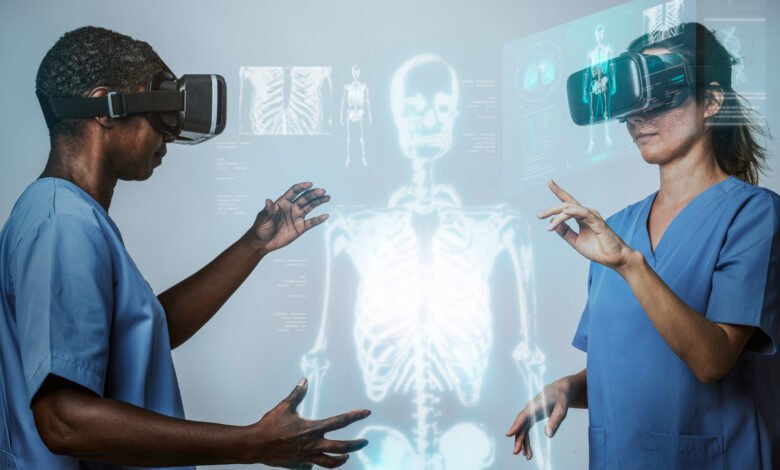The Future of Healthcare: Innovations in the World

The healthcare industry is no exception in a world marked by constant technological advancements. Innovative technologies are reshaping the future of healthcare and approaches that promise to improve patient outcomes, increase accessibility, and reduce costs. In this article, we will explore some of the groundbreaking innovations that are revolutionizing the healthcare landscape.
The Future of Healthcare
The healthcare sector has always been at the forefront of adopting innovative technologies to enhance patient care. Today, as we stand on the brink of a new era in healthcare, it’s crucial to understand the key innovations that are set to redefine the industry.
Telemedicine and Remote Monitoring
The Future of Healthcare: Telemedicine has emerged as a game-changer in the healthcare industry, allowing patients to connect with healthcare professionals remotely. This innovation profoundly impacts how healthcare services are delivered and received.
Read More: How to Improve Your Eye Health: Tips for Brighter Vision
Telemedicine’s Reach
One of the remarkable aspects of telemedicine is its ability to reach patients who are geographically distant from healthcare facilities. Whether you live in a bustling city or a remote village, as long as you have an internet connection, you can access medical expertise.
Convenience and Accessibility
Telemedicine offers unparalleled convenience. Patients no longer need to endure long commutes, waiting rooms, or time-consuming journeys to see a doctor. Instead, they can have virtual consultations from the comfort of their homes. This accessibility is particularly valuable for individuals with mobility issues, elderly patients, or those living in rural areas with limited healthcare resources.
Real-Time Monitoring
Remote monitoring is another facet of telemedicine. Wearable sensors can track various health parameters like heart rate, blood pressure, and glucose levels. This real-time data is transmitted to healthcare providers, enabling them to proactively monitor a patient’s health. This approach is especially crucial for managing chronic conditions like diabetes or hypertension.
Reduced Healthcare Costs
Telemedicine can also contribute to cost savings. Patients can avoid unnecessary emergency room or urgent care facility trips for non-emergency issues. Moreover, virtual consultations often come at a lower cost than traditional in-person visits.
Emergency Situations
In emergencies or during crises like the COVID-19 pandemic, telemedicine has played a pivotal role in ensuring that individuals still receive medical attention without risking exposure to infectious diseases. It has acted as a lifeline for healthcare continuity.
Preserving Healthcare Resources
The Future of Healthcare: Telemedicine benefits patients and helps healthcare facilities manage their resources more efficiently. It can reduce hospital overcrowding, allowing medical professionals to focus on critical cases while providing routine care remotely.
Privacy and Confidentiality
Telemedicine platforms prioritize patient privacy and confidentiality. Secure and encrypted communication ensures that sensitive medical information remains protected.
In conclusion, telemedicine and remote monitoring represent a monumental shift in healthcare delivery. They offer convenience, accessibility, and real-time healthcare management, all while reducing costs and preserving valuable healthcare resources. This innovation is poised to play an increasingly significant role in shaping the future of healthcare.
Artificial Intelligence in Diagnostics
The Future of Healthcare: Artificial Intelligence (AI) has ushered in a new era in healthcare diagnostics, revolutionizing how medical professionals identify and treat various conditions. This innovation harnesses the power of machine learning algorithms to enhance the accuracy and speed of diagnosis.
Enhanced Accuracy and Speed
AI-powered diagnostic systems excel at processing vast amounts of medical data swiftly and accurately. These algorithms can detect subtle patterns and anomalies that might be challenging for even the most experienced human diagnosticians to identify. As a result, they provide faster and more precise diagnoses.
Early Detection
One of the most significant advantages of AI in diagnostics is its ability to detect diseases early. By analyzing historical patient data and comparing it to a vast database of medical records, AI systems can identify potential health risks before they manifest into severe conditions. This early detection is critical for improving patient outcomes.
Tailored Treatment Plans
AI doesn’t stop at diagnosis; it also assists in tailoring treatment plans. AI algorithms can recommend personalized treatment options by considering a patient’s unique medical history and genetic makeup. This approach ensures that patients receive therapies that are effective and tailored to their specific needs, reducing the risk of adverse effects.
Reduced Human Error
While healthcare professionals are exceptionally skilled, they are not immune to fatigue or the potential for human error. AI systems provide consistent, objective, and error-free analyses, eliminating the risk of misdiagnoses due to fatigue or oversight.
Efficient Resource Allocation
AI can help healthcare facilities allocate their resources more efficiently. Automating routine diagnostic tasks frees healthcare professionals to focus on complex cases and patient care, ultimately improving the overall quality of healthcare services.
Advanced Imaging
AI is also transforming medical imaging. AI-powered algorithms can enhance the clarity of X-rays, MRIs, and CT scans, making it easier for radiologists to identify abnormalities and diseases. This technology is particularly valuable in fields like radiology and pathology.
Chronic Disease Management
AI plays a crucial role in managing chronic diseases. For example, it can predict disease exacerbations in conditions such as asthma or diabetes, enabling patients and healthcare providers to take proactive measures to prevent worsening symptoms.
Ethical Considerations
While AI in diagnostics offers numerous benefits, it also raises ethical concerns. Ensuring data privacy, obtaining informed consent, and maintaining transparency in AI algorithms are essential considerations.
Robotics in Surgery
The Future of Healthcare: Robotic-assisted surgery is becoming increasingly common. Surgeons can now perform intricate procedures more precisely, leading to quicker recovery and reduced complications.
Personalized Medicine
The Future of Healthcare: The concept of personalized medicine involves tailoring treatments to an individual’s genetic makeup. With advancements in genomics, healthcare providers can prescribe more effective medications and therapies with fewer side effects.
3D Printing in Healthcare
The Future of Healthcare: 3D printing is used to create custom implants, prosthetics, and organs. This technology can potentially revolutionize organ transplantation by eliminating the need for donors.
Wearable Health Tech
The Future of Healthcare: Wearable devices like smartwatches and fitness trackers are not just for tracking steps and heart rate. They can monitor various health parameters, providing patients and healthcare providers with real-time data.
Virtual Reality Therapy
The Future of Healthcare: Virtual reality (VR) is a therapeutic tool for treating anxiety, phobias, and post-traumatic stress disorder. It offers an immersive and controlled environment for therapy.
Blockchain in Healthcare
The Future of Healthcare: Blockchain technology is enhancing data security and interoperability in healthcare. It ensures that patient records are secure, tamper-proof, and easily accessible to authorized parties.
The Impact of Innovations on Healthcare
The Future of Healthcare: These innovations are not just technological marvels; they are poised to profoundly impact the healthcare ecosystem.
Improved Access to Care
Telemedicine and remote monitoring enable patients in remote or underserved areas to access healthcare services. This is particularly valuable during emergencies and pandemics.
Enhanced Diagnosis and Treatment
AI-powered diagnostics and personalized medicine ensure patients receive accurate diagnoses and treatments tailored to their needs. This can lead to better outcomes and reduced healthcare costs in the long run.
Surgeon Assistance and Precision
Surgery robots allow for minimally invasive procedures, reducing patient trauma and recovery times. Surgeons can also perform complex surgeries with greater precision.
Paving the Way for Future Medicine
The Future of Healthcare: 3D printing and the potential for organ generation could eliminate organ transplant waiting lists and save countless lives.
Empowering Patients
Wearable health tech and virtual reality therapy empower patients to take control of their health and well-being, promoting preventive care.
Read More: 5 Futuristic Health Tech Innovations You Won’t Believe Exist!
Conclusion
In conclusion, the future of healthcare is undeniably exciting, with innovations set to transform how we approach healthcare delivery and treatment. These advancements promise to make healthcare more accessible, accurate, and patient-centric. As we embrace these changes, we must stay informed about the latest developments and how they can benefit patients and healthcare providers.
Furthermore, as we look ahead, it is evident that these innovations will continue to evolve, presenting new opportunities and challenges for the healthcare industry. Healthcare professionals, policymakers, and the public must collaborate and adapt to these changes effectively.
Moreover, the integration of artificial intelligence in diagnostics has accelerated the speed of diagnosis and enhanced its accuracy. This means patients can receive prompt and precise medical attention, reducing the uncertainty and anxiety often accompanying health concerns.
The use of robotics in surgery has revolutionized surgical procedures. Surgeons can now perform complex operations with unprecedented precision, leading to quicker recovery times and fewer complications. This not only benefits patients but also reduces the burden on healthcare facilities.
Looking further into the future, 3D printing holds the potential to redefine organ transplantation. The ability to create custom implants, prosthetics, and even organs means that patients needing transplants may no longer have to wait for donors, ultimately saving lives and reducing transplant waiting lists.
Wearable health tech and virtual reality therapy empower patients to take an active role in managing their health. These technologies provide real-time data and immersive therapeutic experiences, promoting preventive care and mental well-being.
Incorporating blockchain technology into healthcare safeguards patient data, ensuring it remains secure and tamper-proof. This enhances patient privacy and facilitates interoperability among different healthcare providers, leading to more coordinated and efficient care.
FAQs
Are these healthcare innovations available to everyone?
These innovations are becoming more accessible to the general public, thanks to technological advancements and reduced costs.
How does blockchain enhance healthcare security?
Blockchain ensures that patient data is encrypted and securely stored, reducing the risk of data breaches and unauthorized access.
Can 3D printing create functional organs?
While it’s still a developing field, 3D printing has shown promising results in creating functional tissues and organs for transplantation.
Are there any ethical concerns with personalized medicine?
Ethical concerns mainly revolve around privacy and consent when collecting and using genetic data for personalized treatments.
What’s the potential for virtual reality therapy in mental healthcare?
Virtual reality therapy has shown great promise in treating various mental health conditions, offering a safe and controlled environment for therapy sessions.







